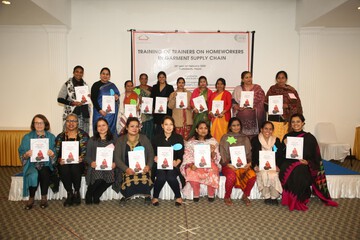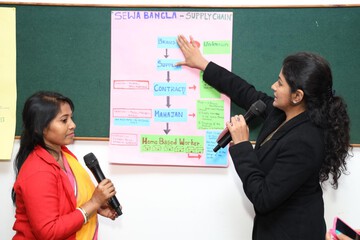Building Capacities Of Homeworkers In Garment Supply Chains: HNSA Launches A Comprehensive Toolkit At A Training Of Trainers In Kathmandu
South Asia’s 50 million home-based workers, a majority of whom are women, are significant contributors. Their earnings ensure the welfare of their families, communities and national economies. Within this 50 million, homeworkers – a category of home-based workers who earn piece-rates – are an integral but unrecognised link in global and domestic garment supply chains. Homeworkers, across the region, have little legal protection and the codes of conduct, upheld by companies, do not cover them. They are excluded from social security programmes and are vulnerable to exploitation.

HNSA launches 'Working In Garment Supply Chains: A Homeworker's Toolkit' that addresses the concerns of homeworkers in global garment supply chains, in South Asia, at a Training of Trainers in Kathmandu, Nepal.
To address the concerns of homeworkers in global garment supply chains, in South Asia, HomeNet South Asia (HNSA) – a network of home-based worker organisations in the region – has developed a toolkit that offers a comprehensive picture of the issues faced by homeworkers in these supply chains and offers possible recommendations to remedy these concerns.
To link homeworkers to the toolkit, HNSA, with support from WIEGO and DFID’s WoW Programme, recently organised a two-day ‘Training of Trainers’ (ToT) for homeworkers in garment supply chains, in Kathmandu, Nepal. Twenty-seven homeworkers and organisers from Bangladesh, India, Nepal, and Pakistan participated in the event that was held on 25th and 26th of February, 2020. Simultaneous translations were provided by each participating organisation’s staff members to help homeworkers gain a thorough understanding of the topics being presented. The objective of the training was to:
- Build knowledge on global and domestic garment supply chains.
- Discuss the different issues homeworkers face within supply chains, and
- Strengthen the skill and capacity of homeworkers to address issues within supply chains.

Homeworkers from SEWA Bangla, India, map their supply chain as part of an exercise during the two-day training.
The training module was centred on the contents of the toolkit with specific focus on: Global and Domestic Supply Chains, Organising, Minimum Wages, and Transparency. Information and findings on these topics were shared and discussed through presentations, videos, group work, simulations, experience sharing, and interactive discussions that allowed participants to grasp each topic.

During the training, homeworkers used various tools to unpack topics. Here, homeworkers engage in role play to showcase how they can work together to negotiate for better piece-rates with contractors.
During the course of the training, homeworkers recognised that organising was key to increasing their collective voice and in establishing bargaining power to negotiate for better working conditions and piece-rate wages. The training included a module on the calculation of piece-rate wages, fair wages, and the need to include costs of production in their piece rates. This, homeworkers shared was a powerful learning along with the training’s emphasis on the need for homeworkers to use transparency tools like written contracts prior to accepting work orders and logbooks to record work and piece rates.
Solidarity is a powerful tool for homeworkers. It can provide homeworkers with an avenue to articulate their rights as workers so that they too can lead a life of dignity. This was internalized by participants during the training. Participants, from across nations, expressed solidarity through songs. From India, homeworkers filled up the room with strains of “Hum Sab Ek Hai” (We Are One) while participants from Pakistan sang “Tanha Nahin, Tanzeem Hai Hum” (We Are Not Alone, We Are Organised).
As a follow-up to the training, HNSA will translate ‘Working in Garment Supply Chains: A Homeworkers Toolkit’ into four languages - Urdu, Hindi, Bengali and Nepali. This, HNSA hopes will help homeworkers conduct similar trainings in their respective countries. The English version of the toolkit can be found at Click here
| Attachment | Size |
|---|---|
| Building Capacities Of Homeworkers In Garment Supply Chains HNSA Launches A Comprehensive Toolkit.pdf | 980.37 KB |

